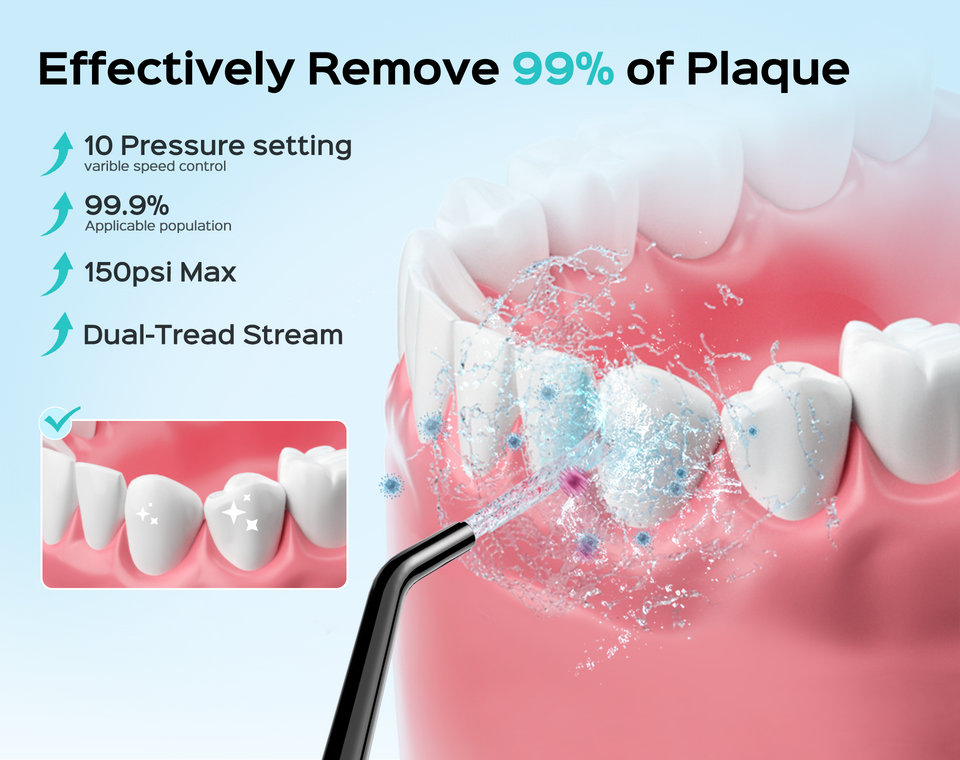Unlock the Secret to a Radiant Smile with These Must-Have Oral Hygiene Tools!
Oral hygiene is not just about having fresh breath; it’s a crucial aspect of overall health that contributes significantly to a radiant smile. Proper oral care can prevent a range of dental issues, from cavities to gum disease, and enhance your confidence. Recently, a lively debate has emerged in the dental community regarding the optimal use of water flossers—should they be employed before or after brushing? This article will delve into the world of oral hygiene tools, exploring the effectiveness of water flossing and other essential products to help you maintain a dazzling smile.

The Role of Water Flossing in Oral Hygiene
Water flossing, often referred to as oral irrigating, utilizes a stream of pulsating water to remove food particles and plaque from between teeth and below the gum line. Unlike traditional flossing, which can be tedious and sometimes uncomfortable, water flossers offer a gentler yet effective alternative. Research indicates that water flossing can significantly reduce gingivitis and plaque buildup, making it a valuable addition to any oral care routine. Many users report that water flossers are easier to handle and less painful, which encourages consistent usage. A friend of mine, who previously struggled with traditional flossing, found that incorporating a water flosser into her daily routine dramatically improved her gum health and made her feel more confident about her smile.
Water Flossing: Before or After Brushing?
The question of whether to use a water flosser before or after brushing is a topic of considerable debate among dental professionals. Advocates for using a water flosser before brushing argue that it helps dislodge food particles and plaque, making brushing more effective. On the other hand, those who recommend water flossing after brushing believe it helps rinse away any remaining debris and ensures a thorough clean. Each method has its merits, but it ultimately depends on personal preference and specific dental needs. Some dental experts suggest that individuals with braces or other dental appliances might benefit more from water flossing before brushing, while others emphasize that it can be a matter of routine and comfort. Consulting with a dentist can provide clarity on what works best for you.
Must-Have Oral Hygiene Tools
To achieve optimal oral health, a variety of tools can be integrated into your daily routine. Essential items include manual and electric toothbrushes, each catering to different preferences and needs. Electric toothbrushes often provide a more thorough clean due to their consistent bristle movement, while manual ones can be more accessible and easier to control. Water flossers, as previously mentioned, are invaluable for effectively cleaning between teeth. Additional tools such as mouth rinses can help reduce oral bacteria and freshen breath, while tongue scrapers assist in removing bacteria buildup on the tongue. Each of these tools plays a unique role in maintaining oral health, and exploring various options can lead to a more personalized and effective oral hygiene routine.
How to Choose the Right Tools for Your Oral Care Routine
Selecting the right oral hygiene tools is essential for creating a routine that works for you. Begin by assessing your individual needs—do you have specific dental concerns like gum sensitivity or braces? Are you looking for convenience or effectiveness? Electric toothbrushes are often advantageous for those who struggle with manual brushing; however, manual toothbrushes can be just as effective if used correctly. When it comes to water flossers, consider models that offer adjustable pressure settings, especially if you have sensitive gums. Don't hesitate to reach out to your dental professional for tailored recommendations based on your unique oral health profile. They can provide insights that align with your goals and lifestyle.
Enhancing Your Oral Hygiene Routine
In conclusion, the journey to a radiant smile starts with understanding the importance of effective oral hygiene tools. Water flossing, whether used before or after brushing, has proven to be a beneficial practice in maintaining oral health. By incorporating a variety of essential tools into your routine, from toothbrushes to mouth rinses, you can enhance your dental care significantly. As you reflect on your current practices, consider how these recommendations can fit into your daily routine to achieve that dazzling smile you desire. Remember, investing in your oral health is an investment in your overall well-being!













